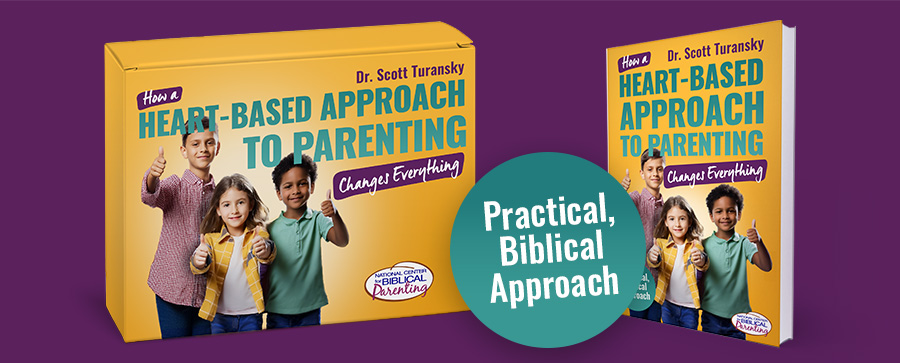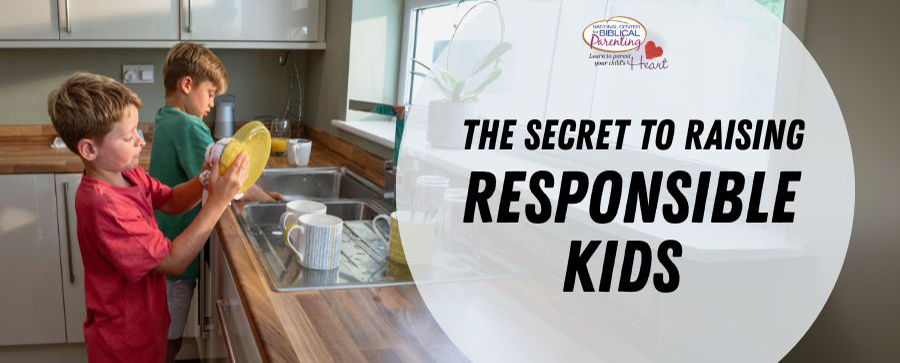The Secret to Raising Responsible Kids

Every parent has said it a hundred times:
“I need you to clean your room.”
“I need you to take out the trash.”
“I need you to get started on your homework.”
It’s understandable—we’re busy, and the things that need to be done feel urgent. But there’s a subtle message hiding in that phrasing. When we say, “I need you to…,” the responsibility sounds like it still belongs to us, not them.
What if we could flip that internal message?
What if children began to hear from us—and eventually from inside their own hearts—“You need to…”?
That’s the language of the conscience. And with a simple shift in vocabulary, you can begin to strengthen your child’s internal motivation and build a deeper sense of responsibility, thus training the conscience.
The Conscience: God’s Internal Guidance System
The Bible speaks often of the conscience. In Acts 23:1, Paul says, “I have fulfilled my duty to God in all good conscience to this day.” Notice the word duty—that’s the prompting of the conscience at work. It’s not just about knowing right from wrong; it’s about feeling an inner obligation to do what’s right.
That inner sense of duty is what moves children from merely following rules to taking ownership for their actions.
When you train a child’s conscience, you are helping them develop an inner voice that says:
- “I should finish my chores.”
- “It’s time to get ready without being reminded.”
- “I need to be honest right now.”
This is more than behavior management—it’s heart-based parenting.
Why “You Need To” Works
The phrase “You need to…” mirrors the language of the conscience.
When a child hears, “You need to get your schoolwork done,” it communicates that this is their task, their responsibility, and their opportunity to grow. The more they hear it from you, the more they’ll begin to hear it internally—prompting them even when you’re not around.
Compare that to “I need you to get your schoolwork done.” That’s parent-centered. The focus is on the parent’s need, not the child’s responsibility.
This may seem like a small difference, but over time it changes how a child perceives responsibility. One approach builds external compliance; the other builds internal character.
Practical Ways to Use “You Need To” in the Home
For Younger Children (Ages 3–10)
At this age, kids are forming habits and routines. Parents are still the primary motivators, but this is the perfect time to begin shifting responsibility.
Instead of saying:
“I need you to pick up your toys.”
Try saying:
“You need to pick up those toys now. That’s your job.”
Instead of:
“I need you to brush your teeth now.”
Try:
“You need to brush your teeth because it’s bedtime.”
Why it works:
This slight shift nudges children to own their tasks, even if they still need reminders. Over time, they begin hearing you need to in their own hearts—and that’s the conscience being shaped.
You can also reinforce the prompting function of the conscience by asking questions like:
- “What do you need to do next?”
- “What’s your job right now?”
- “What would be the right thing to do?”
This kind of coaching language engages the heart and mind—not just behavior.
For Older Children & Teens (Ages 11–18)
Older kids are highly aware of autonomy, which is why it’s essential to transfer responsibility to them deliberately. They need to feel the weight of their decisions without you carrying it for them.
Instead of saying:
“I need you to clean your room before friends come over.”
Try saying:
“You need to decide what kind of environment you want to live in. Keeping your room clean shows you’re taking ownership.”
Instead of:
“I need you to finish your project.”
Try:
“You need to follow through on your commitments. That’s how you grow into someone others can trust.”
Also consider asking reflective questions like:
- “How do you know when it’s time to start studying?”
- “What does it look like to take initiative with your responsibilities?”
- “How is your conscience speaking to you right now?”
This approach is empowering. You’re not just correcting behavior—you’re training your teen to listen to the inner promptings of the conscience that God gave them.
Responsibility Is Learned Through Practice
Scripture teaches that responsibility grows through faithfulness in small things.
Jesus said in Matthew 25:21, “Well done, good and faithful servant! You have been faithful with a few things; I will put you in charge of many things.”
That’s a good parenting model. It might not be good to say, “Well done, good and faithful servant,” but the idea of commending a child for being responsible is important.
When a child practices responsibility in little ways—setting the table, remembering homework, managing a bedtime—they’re building internal muscles that will sustain them in adulthood.
But this kind of growth doesn’t happen by accident. It happens when parents train the conscience with intention, repetition, and clear, moral vocabulary.
Final Encouragement
You may be thinking, “I’ve been saying it wrong for years.” That’s okay. It’s never too late to start using heart-based vocabulary in your parenting.
Try this today:
- Choose one common instruction and rephrase it with “You need to…”
- Reinforce the idea of doing what’s right—even when no one is watching.
As you do, your child’s sense of obligation will grow. Their conscience will strengthen. And they’ll begin to act—not just because you told them to, but because something inside them is calling them to do what’s right.
That’s the kind of responsibility that sticks.
That’s how the heart grows strong.
Would you like to learn more practical heart-based strategies?

Learn more about the parenting course called “How a Heart-Based Approach Changes Everything” Here’s the link: https://app.biblicalparenting.org/it-changes-everything
Learn how to train the heart—not just manage behavior.


Leave a Reply
Want to join the discussion?Feel free to contribute!